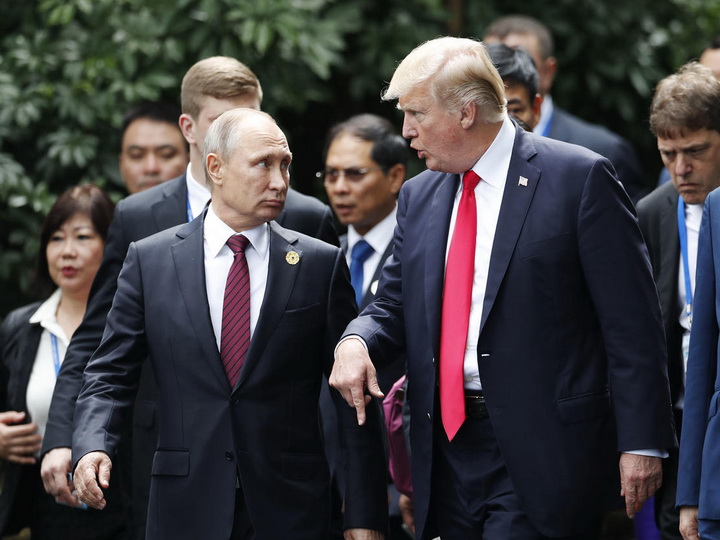US in the Caucasus: Beat the Russians at their own game

It is a long-established and venerated practice for members of Congress to take special interest in foreign policy issues. As a “big picture” governance item, U.S. lawmakers must not violate nor disregard American foreign policy, as this stands largely within the purview of the executive branch.
Yet all too often in recent years, certain members of Congress have refused to adhere to these limits and have run afoul of U.S. policy — particularly those lawmakers who disgracefully shill for Russia.
It is not surprising, nor inappropriate, for members of Congress to give voice to their constituent groups and their associated lobbies’ narrow interests. However, such interests are trumped by the best interests of the American people, U.S. global or regional plans and, pointedly, to the lawmakers’ sworn Constitutional responsibilities.
Lobbies do not always espouse smart policies from an American viewpoint. Many groups, typically ones campaigning on behalf of non-U.S.-allied nations, tend to promote policies that benefit their home nation with little regard for America’s best interests. The lawmakers and/or policymakers who aid and abet these lobbies have clearly not considered the issues to which they lend their names.
The South Caucasus region represents a contemporary example of this mistaken lobbying. The issue is not the Armenian lobby’s right to petition Congress or the administration in support of their claims. Rather the issue is whether their claims, frequently contrary to the best interests of the Republic of Armenia, really advance American interests.
A key focus point of Armenian lobbying in the U.S. is to stigmatize and delegitimize Armenia’s neighbor, Azerbaijan. The two former Soviet Republics have been embroiled in a “frozen” conflict over the Azerbaijani territory of Nagorno-Karabakh that Armenia, with the help of their Russian benefactors, has occupied for more than 25 years.
During this period, Armenia has become increasingly dependent on Russian largess (economic, military, political) to the point of effectively serving a vassal of the Russian Federation and at its pleasure. Given the activity of the Armenian lobby in the U.S. and the aforementioned “relationships” with members of Congress, the Kremlin seems to enjoy a direct, yet surreptitious line, directly to offices on Capitol Hill.
The overriding strategic and moral interest of both states is a peaceable resolution of the generation-long war over Nagorno-Karabakh.
In terms of Azerbaijan, the more than 1 million Azerbaijani refugees, who were ethnically cleansed from their lands, would simply like to go home. The government would like to mourn the tens of thousands of Azerbaijani civilians who were butchered by Armenian and Russian forces during the hottest portion of the war and to begin the long process of rebuilding.
Armenia’s most significant obstacle to traverse is internal politics. Numerous Armenians would like to see an independent state, “a second Armenian state,” in Nagorno-Karabakh. The stark reality is that Moscow, whose policies openly benefit from prolongation of war, has used Nagorno-Karabakh to brutally undermine Armenia’s sovereignty to the point that it has little remaining.
Russia has installed itself in an Armenian base with a lease running through 2059 and controls Armenia’s ever-besieged economy. Even as Moscow sells high-tech weapons to both sides (Notably, Russia not only loans Armenia the funds for such purchases, but sells profuse volumes of arms to Armenia at deeply discounted rates) in the Nagorno-Karabakh conflict, Moscow’s generals and political elites proclaim their solidarity with Armenia if war breaks out.
Perhaps most significantly, due to the conflict, Armenia largely stands apart from the world, and the numerous and vast energy, trade, rail and technology projects that have brought such substantial prosperity to the region — from which Armenia has been excluded.
Russian experts are adept at finding reasons why this precarious status quo should not be disturbed, but that outcome serves neither the belligerents nor the U.S. Our main interest should be a peaceful Caucasus, where all the three states are free to develop independently, something that is anathema to Moscow.
The U.S. needs to take a full role in helping lead the protagonists to make the difficult tradeoffs necessary to provide cover against Russia, lest another conflict breaks out and threatens a Russian invasion of Azerbaijan and potential Turkish involvement, which means a NATO ally is affected in its vital interests and a likely regional war.
Under the circumstances, unending declarations that Armenia is wholly virtuous and Azerbaijan wholly evil by members of Congress playing to their home gallery does not advance Armenia’s interest nor America’s. In fact, the only interest that benefits from ongoing war is that of Russia.
Neither of the parties are wholly black or white. Yes, Azerbaijan’s democratization policies are an obstacle to U.S. support. But Armenia is a significantly less than shining or exemplary democratic state. Moreover, both states’ democratic deficits do not supersede the urgent need of both their peoples for peace or the overriding U.S. interest in peace, prosperity and democratization, none of which are attainable if the war continues to fester or explode.
Thus, if Congress wants to help Armenia, the U.S. and even Azerbaijan, it should lend its weight to promoting active U.S. diplomacy that does not leave this crucial region to Moscow’s tender mercies and to war. Uncritical support for Armenia or Azerbaijan ultimately does not benefit either state or serve U.S. interests.
Stephen Blank, Ph.D., is a senior fellow at the American Foreign Policy Council. He is the author of numerous foreign policy-related articles, white papers and monographs, specifically focused on the geopolitics and geostrategy of the former Soviet Union, Russia and Eurasia. He is a former MacArthur fellow at the U.S. Army War College.
thehill.com














